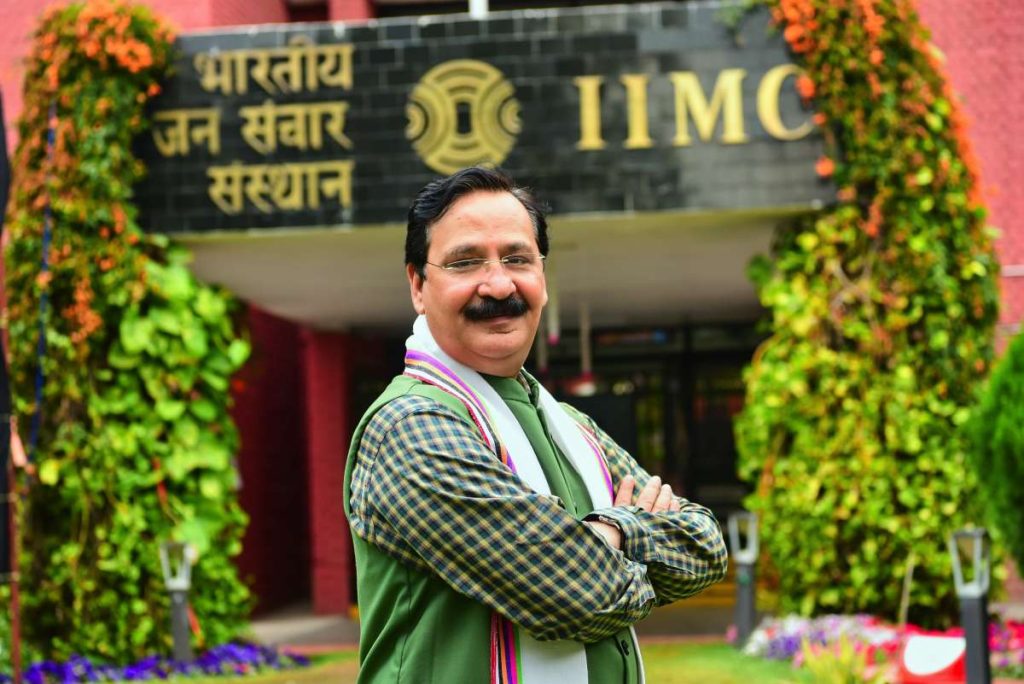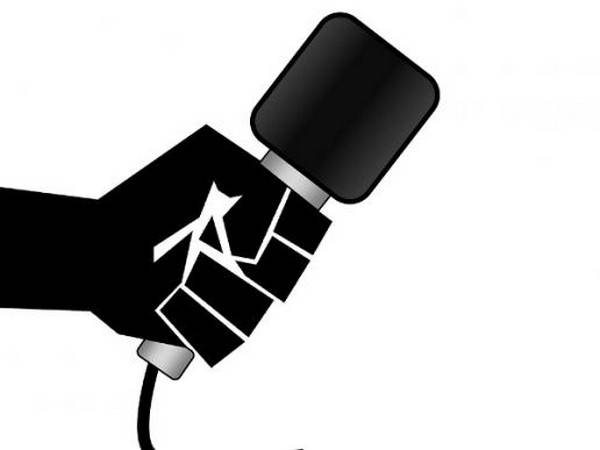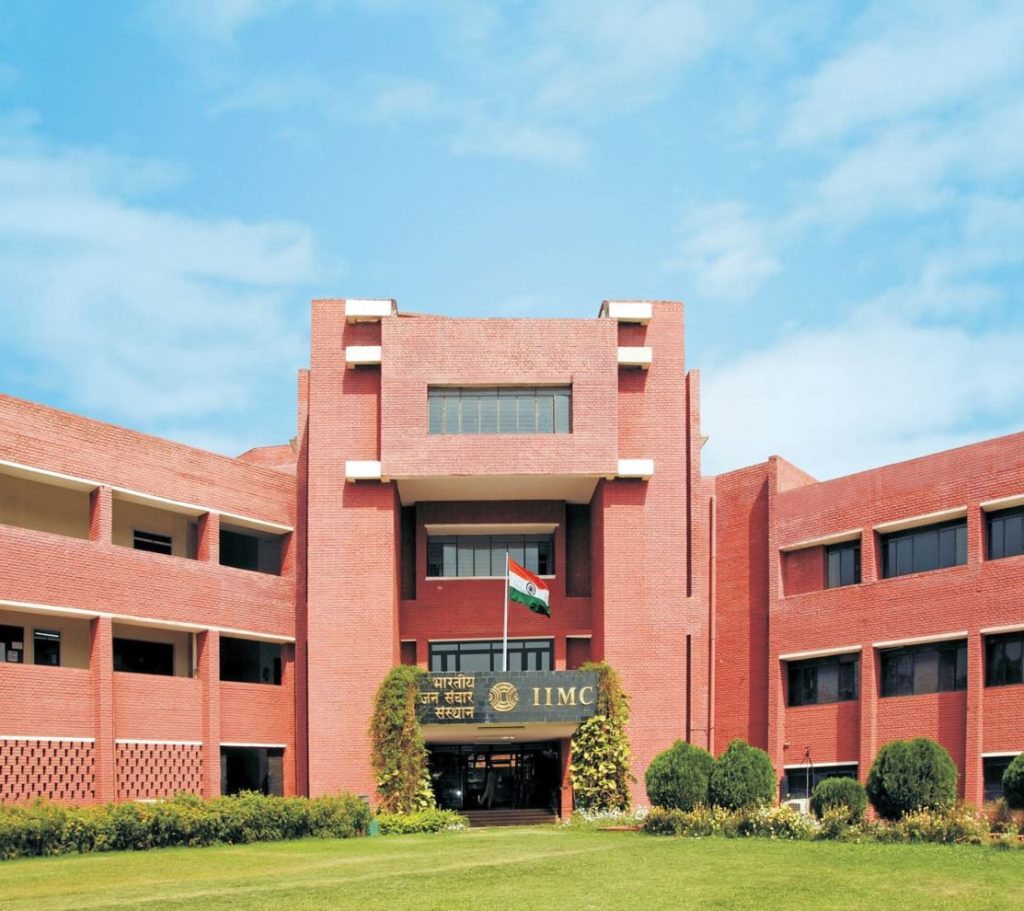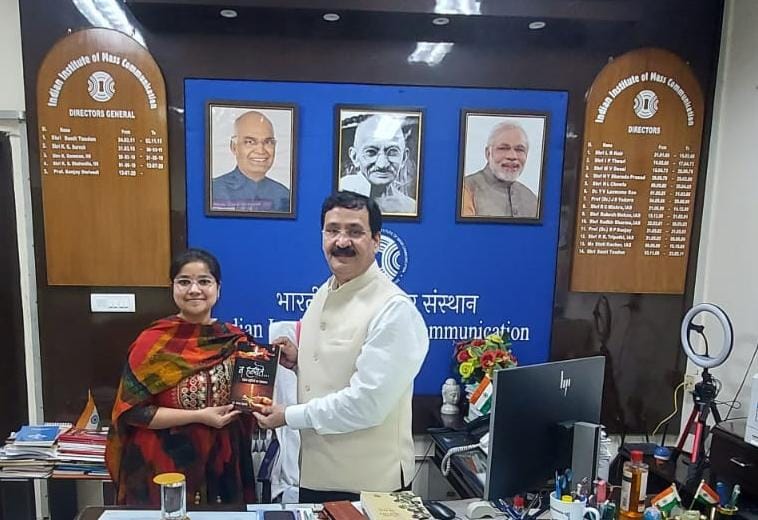Khushboo Agrahari speaks to Prof. Sanjay Dwivedi on different issues concerning the Indian media and particularly his vision for the Indian Institute of Mass Communication (IIMC)
Prof. Sanjay Dwivedi,Director General of Indian Institute of Mass Communication (IIMC), India’s premier media training institute under the Ministry of Information & Broadcasting, Government of India, is the man who has been working tirelessly to take IIMC to new heights in academic and professional excellence. He has introduced a new course of Digital Media in three campuses and also extended Hindi Journalism course to two more campuses of IIMC. His vision for IIMC is to produce ‘newsroom leaders’ for the global media. He underlines the need to make media literacy a mass movement to arrest the spread of fake news. Khushboo Agrahari spoke to him on different issues concerning the Indian media and particularly his vision for the IIMC. Excerpts:
Journalism is active, buzzing, functioning as a healthy arm of the nation’s democratic process. In reality when seen from the inside, newsrooms are brazenly sensationalized to compensate for the deliberate blackout of exclusive stories. What is your assessment of journalism in India – print, TV and digital media – as it is today?
Journalism has undisputedly played a significant role in empowering the citizens and strengthening democracy not only in India but also globally. As far as exclusive news is concerned, even the mainstream media giants are deprived of it due to the penetration of internet and digital devices. However, I don’t think the media today has no opportunity for exclusive stories. There are countless stories in remote areas. But the reporters have to come out of their comfort zones to detect and report them. Today, the problem with a large number of journalists, whether in print, TV or digital media, is that they expect everything from Google at the convenience of their desks. They don’t want to go to the ground. The moment they come out of their comfort zones they will have numerous exclusive stories. Indian Prime Minister Narendra Modi discuses a lot of out of box initiatives by ordinary people and institutions in his monthly radio programme, ‘Mann Ki Baat’, but why is that talent missed by the mainstream media. Sensationalism is heavily denting the credibility of media, particularly TV news. Digital media is very powerful and is growing rapidly, but fake news is costing it immensely. In this situation, people have a lot of expectations from print. I think negativity is also heavily denting the credibility of media across the globe. Various studies at the world level have revealed that readers in high numbers have started distancing from the mainstream media citing that their news stories generate the feel of depression, anxiety and disappointment in them. They feel that there is scope for a lot of positive stories as well and the media should bring them to forefront as well. I completely agree to this. The media should contemplate over it.

Journalism is one of the most noble and pure professions that exists but it is being trafficked for power and money. Do you agree it has lost its innocence, identity and purpose? Why did things dip to such an abysmal low?
Journalism is still a noble and pure profession and I don’t think it has lost its innocence, identity and purpose. It is still a strong pillar of democracy, has maintained its sanctity and keeps people informed. It cannot be discarded due to the misdeeds for some vested interests. All professions witness change of dynamics with the time. Hence, media landscape too is undergoing changes at a global level. The content and language used in the Indian newspapers during 1780’s or 1820’s, witnessed significant changes during 1900’s and 2000’s. It happened perhaps due to the thinking of the new generation and change of technology with every new phase. We cannot compare the present-day media with the media of pre-LPG era. Further, television and digital media have emerged as more powerful tools of information sharing, comparatively. As they are evolving, some issues are also coming up simultaneously and I think both the television and digital media would overcome this phase and would alter its conduct more responsibly in the times to come. As I have mentioned, the media is a very powerful tool and everybody wants to use it and consume it. The politicians are using it for the political gains, while content creators are focused towards higher consumption of their content. What we need today is media literacy and we have to start sensitising our citizens right from the schools. Children should be taught about its nuances since the very beginning. Media literacy should become a mass movement in the country. The day we achieve this goal, nobody will be able to misinform and misguide people in the name of media.
How would you describe freedom of press? Once that is accomplished, ‘watchdog’ journalism has now become ‘lapdog’ journalism.
Press freedom, in my opinion, is the liberty that the media enjoys in expression through different tools of communication on the matters concerning the public. I think media is still a watchdog of democracy and is contributing significantly in canvassing India’s growth story. We should understand a fact clearly that there are multiple agencies, including some foreign powers, which are trying to push their agenda through a section of the Indian media. Their agenda is aimed at destabilizing India because they fear that they would lose their monopoly if India emerges as a global power. We normally consider foreign media as unbiased and progressive, but I find a significant section of foreign media is busy in knitting a fabricated narrative portraying India in a bad light and they are doing it as per the agenda provided by their financers. While doing so the foreign media should understand that the Indians do not trust it today as much as they used to trust some decades ago.

Do you think investigative journalism is dead or dying out?
No, certainly not. I have already mentioned that the journalists have to come out of their comfort zones and widen their horizons. They have to look beyond internet. I have seen the era in media when the editors did not allow their reporters to sit in the office. They always wanted their reporters to be in the field, meet people because they knew that stories would come from the field only. The editors or the people in leading positions in the newsrooms should consider it. The newsrooms should have a dedicated team of investigative journalists and they should not be engaged in day-today reporting. Investigative journalism does not mean only investigating economic offences or criminal cases. There are a lot of opportunities like investigating the implementation of government schemes and projects, investigating the side effects of digital technology in collaboration with the researchers, investigating how foreign powers are destabilizing India’s growth story, assessing the impact of different government projects. Dr. APJ Abdul Kalam, former President of India, repeatedly expected the Indian media to be an active partner in national missions. The Indian media needs to pay more attention to it, as it will help them regain its credibility too.
Democracy with the left and radical Islamists and other separatist groups joining hands to bring democracies to their knees. Do you agree this is happening with the help of media politician’s nexus who only want power and stand not for a democratic system but for a dynasty or even fascists disguised as liberals to get them into power?
These are ideological and political issues. I don’t want to comment on them. The Government agencies are already dealing with them as per law of the land. Media-politician nexus is a cause of worry and it dents the credibility of the media fraternity, the media bodies have to deal it. Extremism only complicates the solution process. Ultimately, peaceful dialogue solves the issues in a democracy.
Gone are the days when authentic news used to be delivered on our screens. Authenticity does not even find a column in the newspapers nowadays. It may sound disturbing but the reality sometimes is truly what we don’t see through. Journalism is not journalism until the journalists don’t attain the freedom to pen down their thoughts. What are your views.
Surely, authenticity or truthfulness is the core element of journalism and news reports have to be distinguished from infotainment and advertisements. But I think there is still authenticity in media reporting. As I have mentioned there is a section in the media which is always agenda-driven and it is because of that section, the media is sometimes seen as biased. Another fact that should not be ignored is that after corporatization the media is like any other business where high profit is the ultimate goal wherein news is treated as a commodity and no longer a service. We teach media ethics in classrooms, but the moment a student enters the newsroom, he/she has to work as per the editorial policies of the media house and which are decided by the circulation and advertisement departments and the main goal of these departments is only profit. It is a global phenomenon.
What we see now is qualitatively different then the days of truthful, courageous, moralistic and a propaganda free media. There is much more behind the scenes and news management corporations which has not only fallen in the lines but also set boundaries for themselves. Do you think media has been taken over completely by corporates entities? If yes how correct is that?
Yes, it is true that media has globally been taken over by corporate entities. The largest media houses in India also are basically the extended wings of corporate giants. After Liberalization, Privatization and Globalization (LPG) process in India, the doors of Indian media were opened for foreign direct investment (FDI). We all know that FDI comes through a set process and every media house opting for FDI has to function in more transparent and professional manner. There is no harm in it. As I have said, the editorial policy of a large number of media houses across the globe is today decided by MBA professionals whose ultimate goal is to ensure maximum profit. From a second to a millimeter, everything holds monetary values in today’s media landscape. The prime job of media is to inform, educate and entertain. These objectives can be fulfilled in a corporate entity also. For it, we need to revive and strengthen the editor’s role in the newsroom in real sense if we want authentic information for the readers.

In a country like India, Indian media, a powerful entity, has been defined as the “Fourth Pillar of Democracy”. Being one of the pillars of India’s democratic nation, it has a huge responsibility to make the nation because it affects the political leanings of people and therefore enables them to make the right decision when choosing a government. How do you think Media has helped shaped the nation in choosing the right politicians and the government?
No doubt, the media has strengthened democracy and has been helping people to play an active role in democratic process. Since the first general elections held in India in 1952, the media has been shaping their opinion about politicians, government policies, actions and the democratic process. Democracy cannot function without vigilant media, as it not only informs but also educates and empowers people. People know about different government initiatives through media only. However, different alternate media tools are available now and the mainstream media has its own significance. Agenda setting in newsroom is hugely impacting the people’s choice of politicians and government.
Media plays a crucial role in the democratic life of the country’s citizens as it keeps people informed about the socio-economic and political state of affairs. Fake news is on the verge of increase day by day. What measures required to end it?
Yes, fake news is the new virus, which is tarnishing media’s image across the world. It is a challenge not only for the government agencies but also for the common citizens. The best remedy, which I think can be adopted, is to make media literacy a mass movement. From schools to colleges and universities it should be part of curriculum and special campaigns should be undertaken to educate people about how to detect fake news and how to curb it. Not only government agencies and public but also the media and academic institutions should join hands for it. Every citizen should be the target audience in this campaign, whether or not he/she uses a smart phone.

How would you differentiate modern journalism from the pre-independence era press of the colonial administration then enacted several acts to regulate the country’s press?
During the colonial era it was very difficult for Indian media to function. Different regulations were introduced to strangulate the Indian media but even then, visionary and missionary journalists of that era defied against all odds and instead of surrendering, preferred to languish in jails for no offence. Can you imagine six editors of a newspaper published from Allahabad were sentenced about 95 years of jail in Andamans. The British government did everything to crush the Indian media, particularly the language media, in those days. Compare to that the media in post-Independence era is working freely. Many ill practices including paid news, fake news, hate news, agenda setting, cross media ownership and propaganda, are seen denting the image of media. Even then the government agencies avoid interfering in the media functioning. The government agencies still expect the media to follow self-regulation. This is the major difference that I understand.
What will media freedom look like in the future. What is the legal status of the media and media freedom in India?
There is no special provision in the Constitution of India to ensure special freedom to media. The media enjoys the same freedom that has been guaranteed to an ordinary citizen under Article 19(1)a. However, this freedom was compromised in 1975. People fought against and it and finally the freedom was restored in 1977. I don’t see any such threat to media freedom in India in coming days.
Journalism is not journalism unless the journalist has the right to think. Would you agree that India lags far behind in providing its journalists with an independent pen and a place to work fearlessly?
There is complete freedom to every journalist in India to pen or think. People are working fearlessly. India is far better in media freedom compared to many other countries of the world. Once you cross the limit, law of the land acts everywhere in the world.
Sir you have been experienced journalist with decades years of experience with time you switched to academic side of it now as the Director General of the prestige Media Institute, IIMC. Which role did you enjoyed the most?
I enjoy both the roles. Even after joining academics, I write every day. My articles appear in dozens of newspapers across the country. I believe media education is all about strengthening the roots with theoretical knowledge and widening the branches with practical exposure. Teaching and writing simultaneously helps me with both.
What’s your future planning after retirement? Do you wish to join Politics?
You will have to wait a lot for my retirement from academics. I have no plan to join politics. I want to shape generations of responsible and trained journalists who shape the media landscape across the globe in coming years.

Leave a Reply